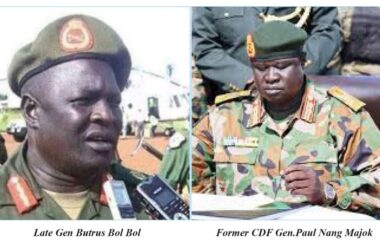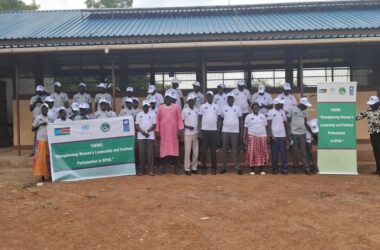By Philip Buda Ladu
United Nations Commission on Human Rights in South Sudan has called for protection of civilians and upholding the Revitalized Peace amid country’s rapidly deteriorating political situation.
In a statement issued on Thursday, the Commission cautioned that recent events, including the arrest of First Vice President Dr. Riek Machar and escalating military clashes, pose a direct threat to millions and could plunge the country back into full-scale war.
“At the heart of South Sudan’s crisis is a failure to protect civilians and uphold the commitments of the Revitalized Peace Agreement,” said Yasmin Sooka, Chair of the Commission. “The deliberate targeting of opposition leaders and civilians represents a reckless disregard for international law and the country’s future.”
Crisis Deepens
Throughout March 2025, violence has surged in multiple regions, including Upper Nile State, where aerial assaults have displaced over 60,000 people according to the UN. The situation escalated following the 7 March attack on a UN peacekeeping helicopter.
Armed confrontations have moved dangerously close to Juba, while opposition figures have reportedly been detained without due process—actions that violate the Peace Agreement’s provisions on political inclusion and rule of law.
The Commission warned that failure to uphold the agreement’s protections—such as freedom of movement, political participation, and cessation of hostilities—will inevitably lead to catastrophic conflict.
“The Peace Agreement is not optional—it is binding,” added Sooka. “It’s systematic undermining by political and military actors is not only unlawful but a betrayal of the South Sudanese people who have already endured years of devastating conflict.”
Foreign Intervention
Adding to the crisis, the deployment of Ugandan troops and their battle tanks into South Sudan, reportedly at the request of President Salva Kiir, has raised serious concerns about violations of the UN arms embargo and the increasing involvement of foreign forces in the conflict.
The commission echoed that this foreign military presence risks exacerbating violence, endangering civilians, and escalating regional tensions.
“The protection of civilians must be the central priority,” said Commissioner Carlos Castresana Fernández. “Instead, we are witnessing actions that increase civilian vulnerability—indiscriminate attacks, arbitrary detentions, and foreign intervention. Many South Sudanese have already suffered the consequences of reckless and criminal political and military decisions that led to full-scale war and ethnic atrocities. It should not be allowed to happen again.”
Call for Immediate Action
The Commission emphasized that all parties to the conflict—including government forces, opposition groups, and militias—are bound by international humanitarian and human rights law. Violations, including war crimes and crimes against humanity, could lead to individual criminal accountability before domestic or international courts.
“We must not allow South Sudan to repeat the mistakes of the past,” warned Commissioner Barney Afako. “Failure to de-escalate the ongoing political and military tension will be cataclysmic. South Sudan’s leaders must urgently sit down across political divides to defuse tensions, reassure an alarmed population, and resolve their differences.”
Afako also urged the international community to take swift action, calling on regional bodies such as the African Union and IGAD, as well as global powers, to engage national leaders and prevent South Sudan from descending into further chaos.
“The way forward is clear: an immediate recommitment to the Revitalized Agreement, the release of political detainees, the cessation of hostilities, and above all—the protection of civilians,” he stated.
The UN Rights body has called on regional and international partners, including the African Union, IGAD, and the United Nations, to intensify diplomatic pressure, support de-escalation efforts, and ensure the full implementation of the Peace Agreement’s provisions.
With tensions rising and the humanitarian crisis worsening, urgent intervention is critical to averting another devastating conflict in South Sudan.



